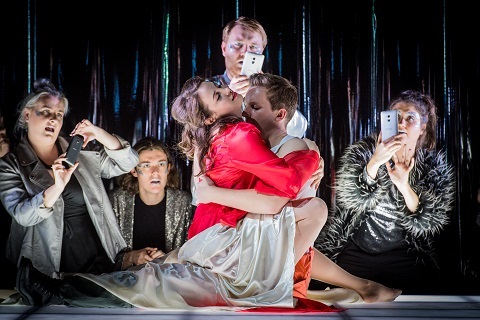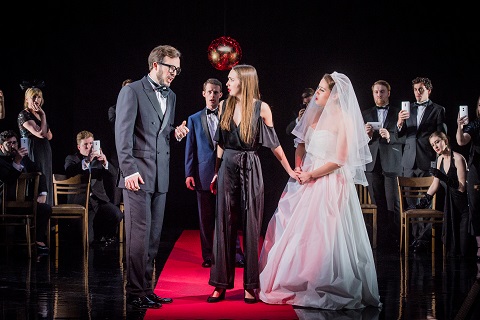16 Nov 2018
Royal Academy's Semele offers 'endless pleasures'
Self-adoring ‘celebrities’ beware. That smart-phone which feeds your narcissism might just prove your nemesis.

Self-adoring ‘celebrities’ beware. That smart-phone which feeds your narcissism might just prove your nemesis.
So suggests Olivia Fuchs, in her new production of Handel’s Semele for the Royal Academy of Music. King Cadmus of Thebes may proclaim ‘flashes of auspiciousness’ to the wedding guests awaiting the nuptials of his daughter Semele and Athamas Prince of Boethia at the Temple of Juno, when the Goddess accepts his sacrifice, but the guests’ celebratory chorus, ‘Lucky omens!’, proves deluded and short-lived.
Their mobile ’phones record every marriage-moment, Instagram-ready for public consumption, but Semele has her eyes on a higher prize: Jupiter. There’s nothing wrong with ambition, but when one’s desires are a merely the reflection of a mirror, aspirations become warped. Not content with being worshipped by mere mortals, Semele desires immortality itself, but her dalliance with the deities seals her own destruction: death not by thunder-bolt but by flash-bulb.
Fuchs’s modern-dress production finds some neat parallels between the marital infidelities of the Ovidian myth; the fears of Handel’s contemporary public that King George II would make his mistress, Amalie von Wallmoden - whom he had set up with a title and large income - Queen of England; and modern-day celebrity-dom, a realm fuelled not by heavenly spheres but by a paradoxical and toxic mix of excess and emptiness. If she pillories those who, in a crisis of identity and authenticity, believe they are ‘stars’ through the seemingly hackneyed opera-trope of the snapping mobile ’phone, then that seems to be Fuchs’ point: the celebs, and the malleable masses, never learn. There’s little star-dust to be found in a life lived as a commodity: an image without substance, offered up for public consumption.
The simple and clear designs, by takis, cleverly elucidate the incompatibility of the earthly and the celestial, and the destruction that is unleashed when these realms interact. During the overture, the curtain lifts to reveal a rather inauspicious wedding venue: a dingy, subterranean ‘bunker’ where, amid the assorted wooden chairs that anticipate the guests’ arrival, the principals enact a mime which usefully outlines allegiances and motivations. If their gestures are sometimes reminiscent of the expressionism of 1920s’ silent cinema, then the hint of histrionics is apt. The guests’ black evening-wear proves fitting when Jupiter’s eagle sweeps Semele up to the stars and events take a more funereal turn.
 Lina Dambrauskaite (Semele), Ryan Williams (Jupiter) and Chorus. Photo credit: Robert Workman.
Lina Dambrauskaite (Semele), Ryan Williams (Jupiter) and Chorus. Photo credit: Robert Workman.
An overhead light-box is lowered and, like a floating four-poster bed, wafts Semele upwards to Jove’s palace, where ‘endless pleasures, endless love’ await her. This Semele’s appetites, both material and carnal, prove insatiable: the chorus swap black for celestial silver and pander to her whims, while the enraged Juno-cum-Anna Wintour (a fine performance by Frances Gregory) plots her demise with her put-upon but willing PA, Iris. Lighting director Jake Wiltshire gives the star-spotted sky a glow of night-club pink and green, creating a palpable sense that the heavenly hedonism is going to come to an end with that metaphorical midnight-chime.
The young cast, the first of two, sang superbly on opening night. Even more impressively, they did so while accomplishing Fuchs’s busy stage directions. In the title role, Lina Dambrauskaitė skilfully showed how Semele’s solipsism grows, from sulky beginnings as she is reluctantly divested of her dressing gown and forced into a frothy gown, through sensuous self-indulgence when she subsequently sheds the candyfloss confection for a crimson silk camisole, to stubborn self-delusion as Jove’s acolytes fawn over and fondle her. Despite the dramatic distractions, Dambrauskaitė’s delivery of the coloratura was near faultless, peppered with some judiciously extravagant elaborations. Her tone was beautifully bright as she anticipated those ‘endless pleasures’, there was a delicious wryness about ‘Myself I do adore’ and few could surely deflect the determined, near-deranged, demands and desires which Dambrauskaitė threw at the hapless Jupiter in ‘No, no, I’ll take no less’.
 Thomas Bennett (Cadmus), Alexander Simpson (Athamas), Olivia Warburton (Ino,) Lina Dambrauskaite (Semele), and Chorus. Photo credit: Robert Workman.
Thomas Bennett (Cadmus), Alexander Simpson (Athamas), Olivia Warburton (Ino,) Lina Dambrauskaite (Semele), and Chorus. Photo credit: Robert Workman.
Ryan Williams did his best to sway his beloved though, and when the champagne, chocolates and flowers, helpfully supplied by Aimée Fisk’s Cupid, failed to win over the piqued and pouting Semele, it seemed for a moment that the sparkly Jimmy Choos might just do it. But, no. This Jupiter shaped his recitative wooing and worship elegantly, lovingly comforted in ‘Lay your doubts and fears aside’, beguiled with gentle lyricism in ‘Where’er you walk’, and warned his wilful woman with vocal punch and persuasiveness in ‘Ah, take heed what you press’. But, the beauties of Arcadia proved less appealing than the temptations of Semele’s own targets.
Olivia Warburton had impressed in the title role of Teseo at the London Handel Festival earlier this year, and here she made a strong impact as Semele’s sister, Ino, finding sadness and serenity in the role: her duet with Dambrauskaitė, when the sisters are briefly re-united in Jupiter’s paradisal gardens was one of the highlights. I’m not sure that her boogie-woogie wiggles to Athamus’s aria of acceptance, ‘Despair no more shall wound me’, sung with clarity and strong projection by Alexander Simpson, were entirely in character, but Warburton’s celebratory cartwheel was certainly impressive.
Thomas Bennett didn’t quite summon sufficient nobility of line as the distressed Cadmus, though his tone was warm; but his recalcitrant Somnus was strikingly sonorous despite his somnolence. Emilie Cavallo (Iris), Maya Colwell (Pasithea) and Joseph Buckmaster (Apollo) completed the fine line-up.
The Chorus were superb: their diction, strength, tone, co-ordination and choreography were all equally notable. The monumental terror and majesty of ‘O terror! and astonishment’ were terrifically emotive and powerful. I found the playing of the Royal Academy Sinfonia a little lacking in colour and character, though the lightness of the ensemble sound did make for some fleet runs. And, there was impressive virtuosity from individual players, especially from the bassoon player who underpinned Jupiter’s worried warning to ‘take heed’. The chamber organ was used to good effect.
At the close, Buckmaster’s Apollo, resplendent in purple suit and silver lame trainers, descended with a babe in his arms: the phoenix that arises from Semele’s ashes, the unborn child of mortal and god. But, despite the choral rejoicing, ‘Happy shall we be’, Athamus seemed disenchanted by Apollo’s reassurance that this baby Bacchus will be a god ‘more mighty than love’, taking umbrage at Ino’s apparent devotion to the new addition to their family and storming off in a jealous sulk, leading Ino to seek solace in father’s arms once more. So, this lieto fine was less than fortunate: disillusionment and disappointment, not dreams, will be your lot, Fuchs seems to say.
Claire Seymour
Handel: Semele
Semele - Lina Dambrauskaitė, Ino - Olivia Warburton, Cadmus/Somnus - Thomas Bennett, Athamas - Alexander Simpson, Jupiter - Ryan Williams, Juno - Frances Gregory, Iris - Emilie Cavallo, Cupid - Aimée Fisk, Apollo - Joseph Buckmaster, Pasithea - Maya Colwell; Director - Olivia Fuchs, Conductor - Laurence Cummings, Designer - takis, Lighting designer - Jake Wiltshire, Royal Academy Chorus and Sinfonia.
Susie Sainsbury Theatre, Royal Academy of Music, London; Wednesday 14 th November 2018.